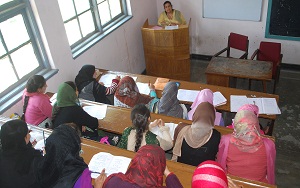Rakib Altaf
SRINAGAR: Hindi, India’s national language, has survived the two decades of violent anti-India campaign in Kashmir.
After the outbreak of armed conflict in late eighties and the exodus of Kashmiri Pandits (ethnic Hindu community), the number of students in the Hindi department of Kashmir University plummeted to just two.
The number of students remained in single digit for nearly fifteen years.
But today the roll has gone up to 45 which include 35 students of the Masters course and 10 research scholars. Majority of them are Muslims while the others come from the minority Sikh community. There are no Hindus.
The language perhaps owes its survival to Professor Zohra Afzal. She recollects the saga thus. “The department was almost defunct. All the students and teachers, who were Hindus, fled to other parts of the country. Only a couple of students stayed and I did. We were Muslims.”
The situation was too depression, but Mrs Afzal held the fort. “Even if we had two students we had to take classes. So I met the vice chancellor, he allowed me to engage adhoc teachers.
Mrs Afzal says she would also hold radio talks to send across a message that Hindi has immense scope in the job market.
‘Jobs’
But the professor continued her struggle for years together before she got an encouraging response. “The situation remained bleak till 2006. Slowly parents came for advice as to how could their children get enrolled without having done their graduation in the subject.”
Mrs Afzal says the university had to start a certificate course to make non-Hindi knowing students eligible for admission to the post-graduate course. “Interestingly, the ones who come here as diploma students are the ones who top the M.A program. This has encouraged others to join.” she says.
The success story continued because whoever passed out of the department got a job “either as a translator or a teacher in a school or college.”
Farah Bhat, one of the students enrolled for the M.A programme, endorses the view of her professor.
“I wanted to do something different, something that only a few in Kashmir did. My father supported me to study Hindi. He says there is immense scope in it. Everybody is concerned about the (job) scope of a course these days,” she says.
‘Embarrassing Questions’
In the same hope of getting a job, Parveeza from the Pattan town, 30 kms north of Srinagar, who did her bachelors in science, joined the Sanskrit department. “I have heard that CBSE schools offer jobs to Sanskrit teachers.”
But the students say they sometimes have to face embarrassing questions from people.
Farah Bhat says “Once a lady asked us why we studied Hindi. We told her what was wrong with that. She replied that it was the language of Hindus. We mostly avoid answering but at other times I tell them the language has nothing to do with the religion.”
A prominent journalist, Rasheed Ahmed says in Kashmir Hindi was always perceived as the language of Indians or Hindus. “In the early nineties, when the armed conflict started, people refrained from studying Hindi as they thought it would identify them with India.”
“Even journalists who worked with Indian newspapers would be reluctant to show their identity cards.”
‘Muslim Hindi Poet’
A Hindi poet from the valley’s southern district of Pulwama, Nida Nawaz has also faced problems. But he says that he is proud to be a Muslim Hindi poet.
Nawaz had done his MA in Urdu but always had a passion to do something unconventional. A friend from Patna would always get him a Hindi newspaper and teach him the basics of the language.
“I first did my honours and finally M.A in Hindi from Patan University,” he says. Later on he wrote a short story which was published in a Jammu-based Hindi newspaper.
“I got letters from different parts of the country which further encouraged me and I got associated with the language.”
Nawaz’s collection of his poetry – AKSHAR AKSHAR RAKT BHARAA – (Every word is blood drenched) based on the turmoil in the valley won him the National Award in 1998.
The poet has participated in several Kavi Sammelans (poetry recital sessions) outside the state, but in the valley he says “I have only friend to share it with, his name is Satish Vimal.”
Satish Vimal and Nida Nawaz often sit over a cup of tea and and recite their poems to each other.
(Translated from BBC Hindi)












